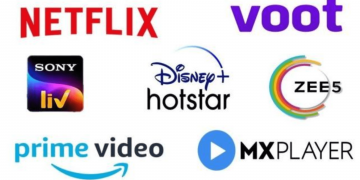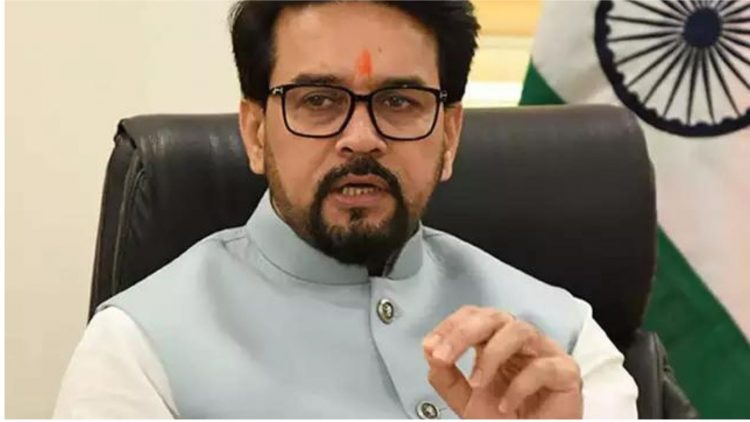India is on the cusp of emerging as the third-largest media and entertainment market globally within the next five years, according to Union Information and Broadcasting Minister Anurag Thakur. Speaking at the inauguration of the 54th edition of the International Film Festival of India (IFFI) in Panaji, Thakur expressed optimism about India’s economic and entertainment industry prospects. He underscored the current standing of India as the fifth-largest economy in the world and noted that the country holds the same position in the global media and entertainment sector. Thakur went on to predict that India, buoyed by its economic and cultural vibrancy, would ascend to the third position in both categories within the next half-decade.
As part of his address, Minister Thakur highlighted the transformative role played by original content creators in India. In recognition of their significant contribution, he announced a new award category at IFFI for the best web series on Over-The-Top (OTT) platforms. This move signifies the acknowledgment of the evolving landscape of entertainment consumption, with digital platforms playing a pivotal role in shaping the industry’s future.
The minister’s optimistic outlook is grounded in the remarkable growth trajectory of India’s economy and its entertainment sector. India’s ascent to the fifth-largest economy is indicative of its economic prowess and the vast potential that exists within the country. The entertainment industry, a crucial component of India’s cultural fabric, has witnessed dynamic shifts in recent years, with the rise of digital platforms and a surge in original content creation.
India’s prowess in the media and entertainment industry has been steadily increasing, with its current standing as the fifth-largest market globally. Minister Thakur’s projection of India reaching the third position in the next five years underscores the nation’s ability to leverage its diverse cultural heritage and rapidly evolving economic landscape.
The COVID-19 pandemic has further accelerated the digital transformation of the entertainment industry, with Over-The-Top platforms gaining prominence as a primary source of content consumption. Thakur highlighted the resilience of the Over-The-Top (OTT) segment during the pandemic, emphasizing its growth rate of 28%. The decision to introduce an award for the best web series on OTT platforms at IFFI reflects the industry’s recognition of the pivotal role played by digital platforms, not only in entertaining the masses but also in providing a lifeline for content consumption when traditional avenues were restricted.
In addition to the acknowledgment of the digital shift, Minister Thakur outlined various initiatives for the 54th edition of IFFI. One notable inclusion is the expansion of the ‘Film Bazaar,’ a platform that traditionally facilitates networking and collaborations within the film industry. This year, the ‘Film Bazaar’ is set to include a curated VFX and tech pavilion, showcasing innovations from the world of cinema. The introduction of this pavilion aligns with the industry’s growing reliance on technology and visual effects to enhance storytelling and cinematic experiences.
Furthermore, Minister Thakur highlighted the festival’s commitment to supporting non-fiction storytelling through the addition of a documentary section in the ‘Film Bazaar.’ This move signifies a broader recognition of diverse storytelling forms and the importance of providing a platform for documentaries that often delve into pressing social issues or untold narratives.
An exciting addition to this year’s IFFI is the introduction of ‘Cine Mela,’ described by Minister Thakur as an extravagant celebration of India’s diversity and culture. This initiative reflects the festival’s commitment to showcasing the rich tapestry of Indian cinema, including regional films that often capture the essence of different cultures and traditions across the country.
The festival also aims to revive and celebrate the magic of classic feature films through a section dedicated to restored cinematic masterpieces. Minister Thakur highlighted the presentation of seven world premieres of meticulously restored films from the National Film Development Corporation (NFDC) and National Film Archive of India (NFAI) under the National Film Heritage Mission. This mission, with its goal of restoring and digitizing 5,000 films and documentaries, represents a significant step toward preserving India’s cinematic heritage for future generations.
In conclusion, Minister Anurag Thakur’s optimistic vision for India’s media and entertainment industry, coupled with the strategic initiatives introduced at the 54th edition of IFFI, signals a transformative period for the nation’s cultural and cinematic landscape. As India continues to harness its economic prowess and cultural diversity, the global recognition of its entertainment industry is poised to grow, affirming its place among the world’s leading media and entertainment markets in the years to come.






































